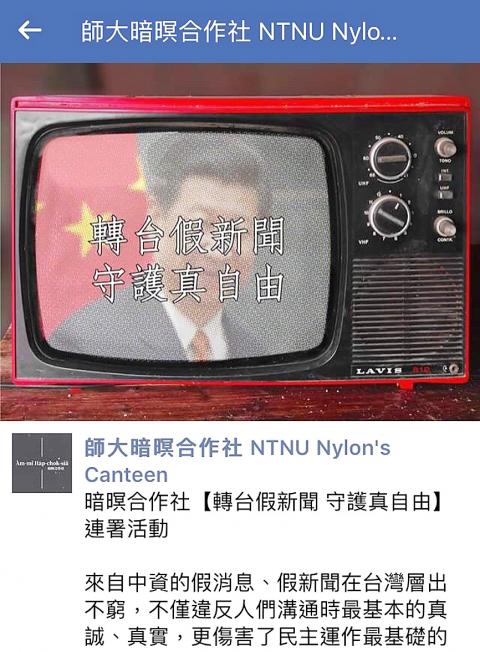National Taiwan Normal University (NTNU) students have joined those from National Taiwan University (NTU) and National Chengchi University (NCCU) in calling for a boycott of CtiTV News over what they call its “fake news coverage.”
The call was made by NTNU’s Nylon’s Canteen, a student group that has about 2,000 followers on Facebook, after NTU and NCCU students earlier this week launched similar campaigns calling for a ban on CtiTV broadcasts on campus.
“There has been incident after incident in which disinformation and fake news were produced by Chinese-funded entities. They have not only violated the basic principles of honesty and genuineness in human communications, but also undermined the principle of trust, which has served as a foundation for democracy,” the group said in an online petition.

Screen grab from Nylon’s Canteen’s Facebook page
The group also criticized communication platforms, such as the Line messaging app, social media sites and news channels, for having “reduced themselves to manufacturers of false information designed to aggravate social division.”
The purpose of the petition, which aims to safeguard “real freedom” by steering away from fake news, is to forge a consensus among NTNU students and faculty before they can issue a collective demand to restaurants on campus and around the school, the group said.
“We encourage the petition participants to take action by switching TV channels,” the group said, adding that it would communicate with restaurants after collecting enough signatures to explain why they refuse to watch news channels that produce “fake news.”
CtiTV News was on Wednesday fined NT$1 million (US$32,441) for failing to adhere to a fact-checking mechanism stipulated in the Satellite Broadcasting Act (衛星廣播電視法).
In January, it was fined NT$200,000 by the National Communications Commission for failing to fact-check its reports about then-Democratic Progressive Party Kaohsiung mayoral candidate Chen Chi-mai’s (陳其邁) rally in Cishan District (旗山) in November last year.
Separately, Shih Hsin University journalism student Tu Kuan-lin (杜冠霖) on Friday launched a similar online petition calling for a boycott of Want Want China Times Media Group (旺旺中時), which owns CtiTV.
Tu accused CtiTV of tarnishing the reputation of journalists.
CtiTV’s failure to practice ethical journalism has made it a negative example for journalism students, Tu said, adding that the channel has hidden behind the banner of “freedom of the press” and paints itself as a victim to avoid making corrections to its news content.
“Does it know no shame?” Tu asked.

Auckland rang in 2026 with a downtown fireworks display launched from New Zealand’s tallest structure, Sky Tower, making it the first major city to greet the new year at a celebration dampened by rain, while crowds in Taipei braved the elements to watch Taipei 101’s display. South Pacific countries are the first to bid farewell to 2025. Clocks struck midnight in Auckland, with a population of 1.7 million, 18 hours before the famous ball was to drop in New York’s Times Square. The five-minute display involved 3,500 fireworks launched from the 240m Sky Tower. Smaller community events were canceled across New Zealand’s

The Ministry of Foreign Affairs (MOFA) yesterday said it is closely monitoring developments in Venezuela, and would continue to cooperate with democratic allies and work together for regional and global security, stability, and prosperity. The remarks came after the US on Saturday launched a series of airstrikes in Venezuela and kidnapped Venezuelan President Nicolas Maduro, who was later flown to New York along with his wife. The pair face US charges related to drug trafficking and alleged cooperation with gangs designated as terrorist organizations. Maduro has denied the allegations. The ministry said that it is closely monitoring the political and economic situation

‘SLICING METHOD’: In the event of a blockade, the China Coast Guard would intercept Taiwanese ships while its navy would seek to deter foreign intervention China’s military drills around Taiwan this week signaled potential strategies to cut the nation off from energy supplies and foreign military assistance, a US think tank report said. The Chinese People’s Liberation Army (PLA) conducted what it called “Justice Mission 2025” exercises from Monday to Tuesday in five maritime zones and airspace around Taiwan, calling them a warning to “Taiwanese independence” forces. In a report released on Wednesday, the Institute for the Study of War said the exercises effectively simulated blocking shipping routes to major port cities, including Kaohsiung, Keelung and Hualien. Taiwan would be highly vulnerable under such a blockade, because it

UNRELENTING: China attempted cyberattacks on Taiwan’s critical infrastructure 2.63 million times per day last year, up from 1.23 million in 2023, the NSB said China’s cyberarmy has long engaged in cyberattacks against Taiwan’s critical infrastructure, employing diverse and evolving tactics, the National Security Bureau (NSB) said yesterday, adding that cyberattacks on critical energy infrastructure last year increased 10-fold compared with the previous year. The NSB yesterday released a report titled Analysis on China’s Cyber Threats to Taiwan’s Critical Infrastructure in 2025, outlining the number of cyberattacks, major tactics and hacker groups. Taiwan’s national intelligence community identified a large number of cybersecurity incidents last year, the bureau said in a statement. China’s cyberarmy last year launched an average of 2.63 million intrusion attempts per day targeting Taiwan’s critical